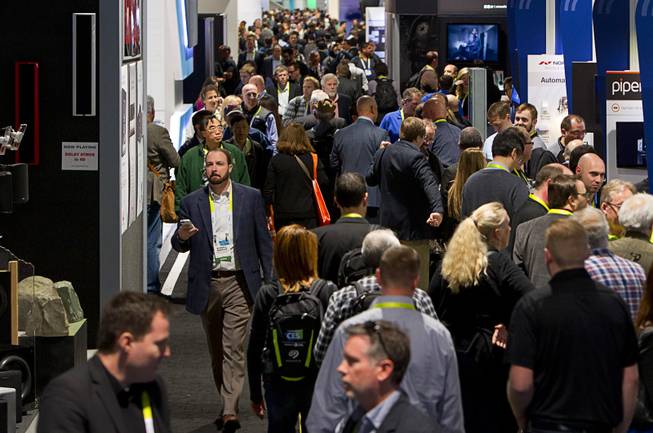
Attendees fill the trade show floor at the 2015 International Consumer Electronics Show on Tuesday, Jan. 6, 2015, at Las Vegas Convention Center.
Tuesday, Sept. 1, 2015 | 2 a.m.
In the past few months, signs at the Las Vegas Convention Center have sounded an ominous warning: “The Las Vegas Convention Center collects location information from mobile devices. If you prefer not to participate, please turn off your Wi-Fi and Bluetooth function or power off.”
With little fanfare, Cox Business, the Internet provider for the convention center, put up the signs in anticipation of anonymously tracking the location of attendees through the facility’s Wi-Fi, data that it says it may use to create real-time heat maps of attendee movements and a mobile app.
The convention center’s location services, currently being tested, could launch as early as the end of the year, possibly before the Consumer Electronics Show in January.
Location tracking is an increasingly popular tool for companies that provide the Internet at public locations such as shopping malls or airports, where managers might find value in maps of how people move around. Data about foot traffic might provide useful when deciding where to build a food court, plant a convention booth, or erect a cafe.
The Las Vegas Convention Center wants to be more competitive in meeting the needs and demands of its clients, said Juergen Barbusca, the communications director for Cox Business in Las Vegas.
After taking over the LVCC contract in 2013, Cox installed a dense Wi-Fi canopy inside the Convention Center, including over 2,100 Wi-Fi access points, located every 60 feet. The Wi-Fi can identify a mobile device whenever a mobile phone sends a signal, or beacons, to its network. The network receives information about a device’s address, but no personally identifiable information about its user, unless a user opts in. “Any device that is sending out messages can be seen,” said John Fountain, Cox Communications' director of technology in Las Vegas.
Across the country, there is an “astonishing level of competitiveness” for conference space, according to Heywood Sanders, a professor of public administration at the University of Texas, San Antonio, and the author of "Convention Center Follies: Politics, Power, and Public Investment in American Cities.” With an enormous boom in conference space over the past several years, some of the largest venues in the U.S., including McCormick Place in Chicago and the Georgia World Congress Center, have struggled to increase their yearly attendance.
Convention centers have experimented with tracking attendees as they roam conferences, said Sanders, including radio-frequency identification technology in badges to track guests’ movement patterns.
Given the ubiquity of smartphones, Sanders said, WiFi monitoring makes it easier to track patterns, although he cautioned that “the real value of (Wi-Fi-based location monitoring) is still open to some question.”
Cox is also exploring an application that would direct attendees to the nearest restroom, connect them with clients or find food locations. Eventually, Cox sees opportunities for advertising and push notifications, should users opt in to the service.
Across the country, many conference centers use Bluetooth technology to track attendee movements, typically contracting with third-party vendors to install temporary Bluetooth beacons that track mobile devices for the duration of the conference. LVCC hopes that its in-house service will be a more cost-effective replacement for RFID badges.

Join the Discussion:
Check this out for a full explanation of our conversion to the LiveFyre commenting system and instructions on how to sign up for an account.
Full comments policy